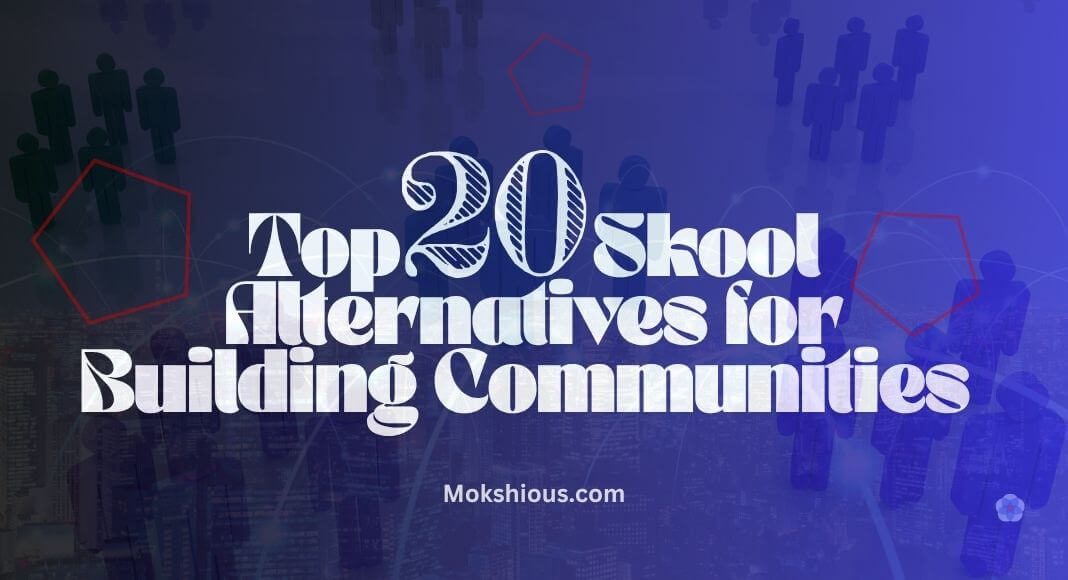Why some creators are exploring beyond Skool
Skool does a great job of combining courses and community in one place, but sometimes you want more than what it offers. Maybe you crave deeper branding control, fresh monetization options, or more flexibility in how members engage. These headaches push creators, educators, and community builders to explore alternatives.
Skool nails simplicity and a clean interface, but it doesn’t handle live streaming, complex automation, or deep white‑label options for apps. More folks now want to find the best course platform for their learning needs. White-label community platforms, strong creator monetization software, or video-first engagement tools. So this post lays out the best Skool alternatives in 2025, each broken down into intro, perks, limitations, and how they stack up against Skool.
If you’re racing to decide which platform to test next, bookmark this post; it’s your go‑to comparison guide.
How we picked these platforms
Imagine you’re building a community where every click matters. I scored each option based on:
- Monetization flexibility, subs, bundles, transaction models
- Branding power, white-label apps, custom domains, and themes
- Content and course hosting, courses, live streams, media libraries
- Engagement features, chat, forums, events, and AI prompts, which are comparable to those found in the top Skool.
- Integration & automation, CRM, Zapier, email marketing
- Scalability & trust, data ownership, compliance, SSO
Top 20 Skool Alternatives
1. Whop
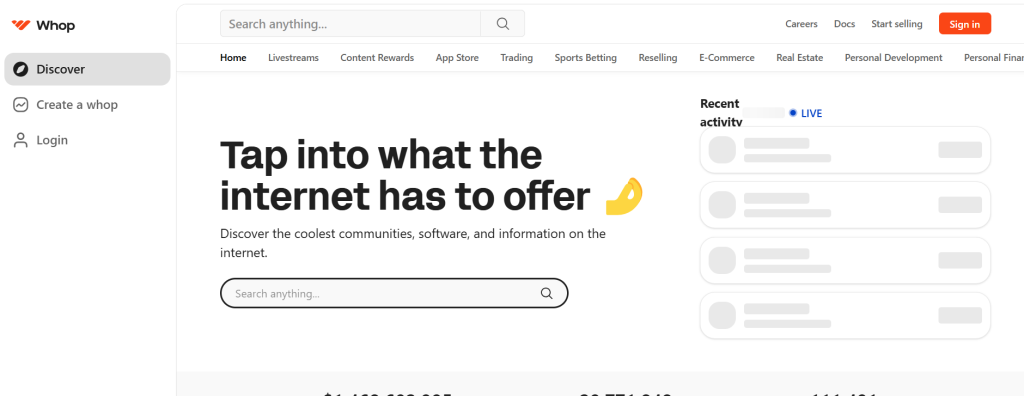
Whoop is like a creator’s Swiss Army knife, offering alternatives to school in 2025. Instead of handing you a fixed “one-size-fits-all” platform, it lets you build your own digital ecosystem with drag-and-drop “whop” apps. Whether you’re running a premium membership, selling niche digital products, or hosting an exclusive community, you can stack features exactly the way you want.
Assets/Features
- Drag-and-drop app builder is a feature that many users find appealing in the best alternative to Skool. So you can shape your community environment without coding.
- Multiple monetization models: subscriptions, one-time purchases, tiered memberships.
- API access is available for developers who want to build custom workflows or integrations.
- Live streaming with in-platform chat for hosting events, Q&A sessions, or paid workshops.
- Marketplace ecosystem for adding new modules and tools on demand.
- White-label mobile apps are available, allowing you to create a unique experience for your users, unlike Skool, so your members engage with your brand, not Whop’s.
- Integrated analytics dashboard for tracking sales, engagement, and retention.
Liabilities
- No native course builder, you’ll need an external LMS if teaching is a big part of your strategy.
- Lower organic discovery potential compared to open communities like Reddit or Facebook Groups.
- More setup time if you want a fully customized experience.
Compared to Skool
Whoop offers more flexibility in monetization and feature design, making it ideal for creators selling more than just courses. Skool, on the other hand, is quicker to launch, with course + community integration baked in from day one.
2. Kajabi
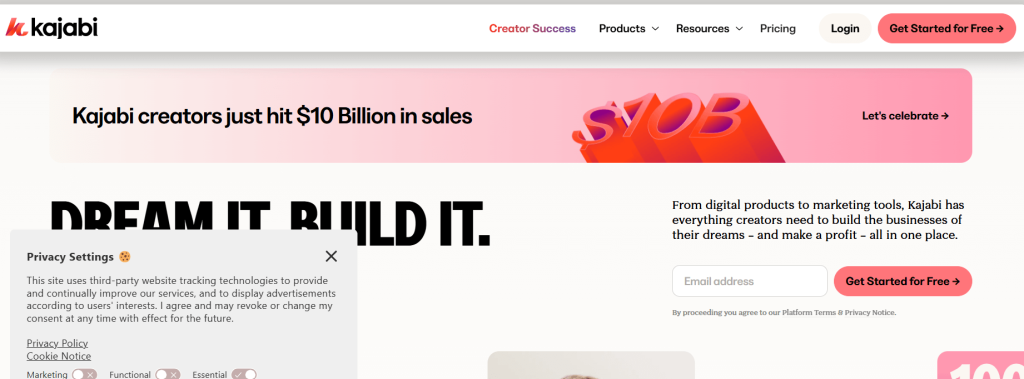
Kajabi is the heavyweight in the all-in-one creator economy space. It’s designed for entrepreneurs who want to run their courses, membership sites, email marketing, and sales funnels under one roof, without juggling multiple tools.
Assets/Features
- Full course creation suite with quizzes, drip content, and lesson organization.
- Built-in funnel builder for creating sales pages, checkout flows, upsells, and downsells.
- Email marketing automation with segmentation and trigger-based campaigns.
- Podcast hosting for diversifying content channels and audience reach.
- White-label customization to match your full brand identity.
- Native payment processing via Stripe and PayPal, making it a viable alternative to Skool.
- Analytics and reporting for tracking revenue, lead sources, and conversion rates.
Liabilities
- Higher monthly cost compared to community-only tools, making it crucial to find the best platform for your budget.
- The community section feels secondary; it’s functional but lacks deep engagement tools.
- It can feel overwhelming for beginners due to its wide feature set.
Compared to Skool
Kajabi wins when you need advanced marketing automation and a full digital product suite. Skool focuses on fostering interaction between members, with gamification and simpler course delivery.
3. Circle
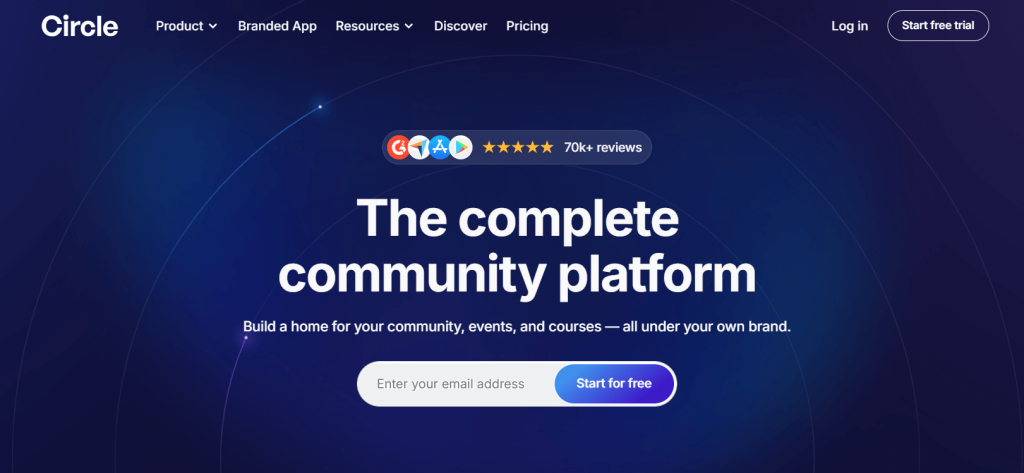
Circle is the “boutique” option for community building, especially for those exploring alternatives. It’s clean, private-first, and incredibly brandable, perfect for creators who want their space to look and feel like their own platform, not a social media offshoot.
Assets/Features
- Spaces for segmenting members into different interest areas or membership levels, a feature that platforms like Skool excel in.
- Customizable UI to fit your brand colors, fonts, and style.
- Live streaming and real-time Q&A sessions are on the platform.
- Embeddable widgets so you can place community discussions on your website.
- Zapier and native integrations for connecting with your CRM, email tool, or payment processor, unlike Skool.
- Advanced member permissions for fine-tuning access.
- Post scheduling and rich media support for consistent engagement, which is a top feature of platforms like Skool.
Liabilities
- No public discovery, growth is on you.
- Lacks a built-in product marketplace for selling courses or memberships, unlike Skool.
- Requires connecting external tools for complex automation, which Skool doesn’t support natively.
Compared to Skool
Circle offers greater design flexibility and embedding options, making it a better choice for those who care deeply about branding and choosing the best platform. Skool is more opinionated in layout but has built-in gamification that Circle doesn’t provide.
4. Discord
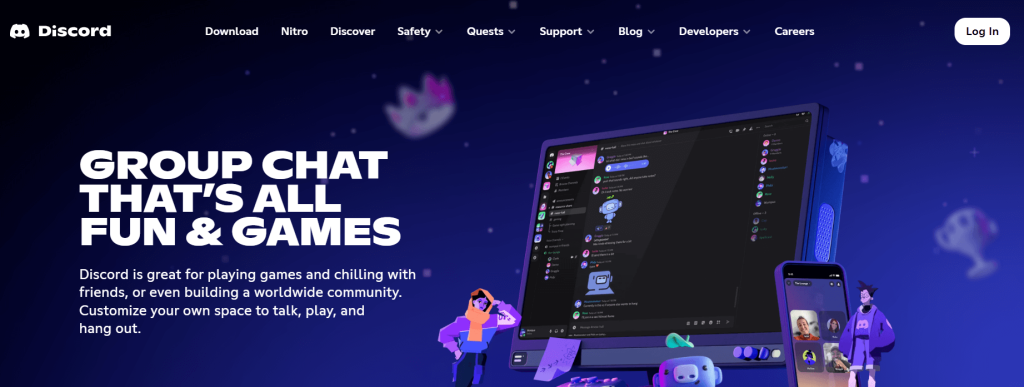
Discord is the king of real-time community interaction. Originally built for gamers, it’s now used by creators, tech founders, and niche hobbyists to host lively chat-based communities with voice and video at their core.
Assets/Features
- Unlimited member capacity for scaling without extra cost, as Kajabi provides affordable solutions for growing communities.
- Voice channels, video calls, and screen sharing for live collaboration, a feature often highlighted in the best alternative to Skool.
- Stage channels are a unique feature that sets this platform apart from its competitors for hosting live events or town halls.
- Custom bots for moderation, gamification, or automation.
- Integration with Patreon and Ko-fi for exclusive member perks.
- Granular role management for controlling access and permissions.
- Push notifications that keep members instantly updated.
Liabilities
- No built-in monetization, requires third-party tools, unlike Skool.
- Thread organization can get messy over time.
- Limited branding options (it will always feel like Discord), whereas Kajabi provides more flexibility in branding.
Compared to Skool
Discord is unbeatable for real-time interaction and “lively chatroom” energy. Skool is better for structured discussions, searchable resources, and course integration.
5. Mighty Networks
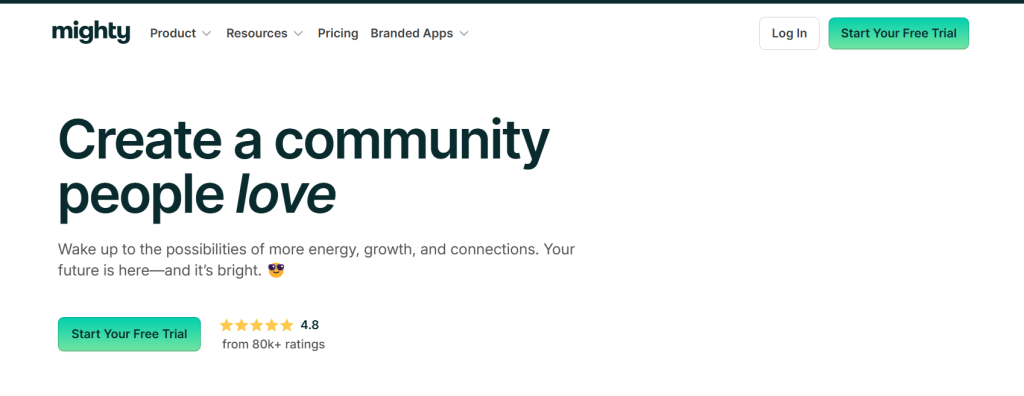
Mighty Networks is a mobile-first, all-in-one platform for courses, events, and memberships, designed to feel more like a social network than a static forum.
Assets/Features
- Native mobile apps for iOS and Android for on-the-go engagement.
- AI-driven engagement prompts to keep conversations alive.
- Tiered memberships so you can cater to different audience segments.
- Built-in course hosting with multimedia support.
- Event creation tools with RSVP management.
- Branded mobile app option for higher-tier plans.
- Community feed that blends posts, events, and content updates.
Liabilities
- White-label branding is only available on the Pro or higher plans.
- Revenue sharing on some pricing tiers is a strategy that Mighty Networks lets creators utilize for additional income.
- It can feel visually busy for new members.
Compared to Skool
Mighty Networks excels in mobile-first community engagement and event hosting. Skool provides a simpler, more focused environment for learning and community without the social network clutter, making it one of the top Skool alternatives.
6. Teachable
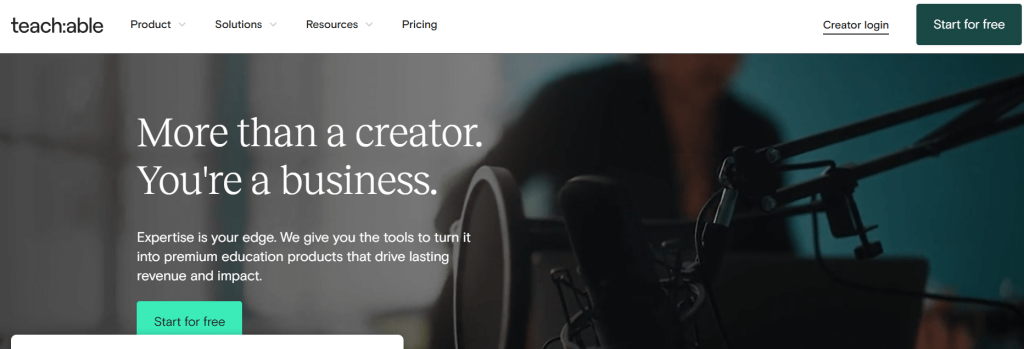
Teachable is a course-first platform built for educators, coaches, and content creators who are looking for a platform to sell structured online learning programs. While it does offer community features, its main strength lies in course sales, delivery, and student management.
Assets/Features
- Straightforward course builder with video, audio, text, and downloadable file support.
- Coaching product option for offering 1:1 or group coaching packages.
- Flexible pricing including subscriptions, one-time payments, and payment plans.
- Affiliate program management to boost sales through partnerships.
- Secure integrated payments via Teachable Payments or PayPal.
- Student progress tracking for insight into learning engagement.
- Built-in checkout pages with upsell and coupon options.
Liabilities
- Community functionality feels minimal compared to dedicated community platforms.
- No built-in live streaming for interactive lessons or events.
- Less emphasis on peer-to-peer engagement, so interaction happens mainly with the instructor.
Compared to Skool
Teachable is better if your top priority is creating and selling online courses with robust payment options. Skool shines if you want a more interactive, gamified community experience alongside learning content.
7. Thinkific

Thinkific is another major player in the online learning space, offering a strong course delivery system with the beginnings of community integration. It’s designed for both individual creators and businesses scaling their training operations.
Assets/Features
- Drag-and-drop course builder vs traditional methods. The platform allows for easy lesson creation, making it user-friendly.
- App store integrations for marketing, analytics, and automation tools.
- Certificates of completion to reward learners and increase completion rates.
- Bulk student enrollment for corporate or large group training.
- Flexible pricing models include memberships, bundles, and free courses.
- Secure payment processing through Stripe and PayPal.
- Basic community add-ons to create discussion spaces for students.
Liabilities
- Community tools are still basic and not as immersive as Skool’s.
- No native live streaming for real-time lessons.
- Learning curve for using all available integrations effectively.
Compared to Skool
Thinkific is ideal for delivering structured training at scale. Skool provides a more engaging, gamified environment where members actively interact beyond coursework.
8. CircleSpace
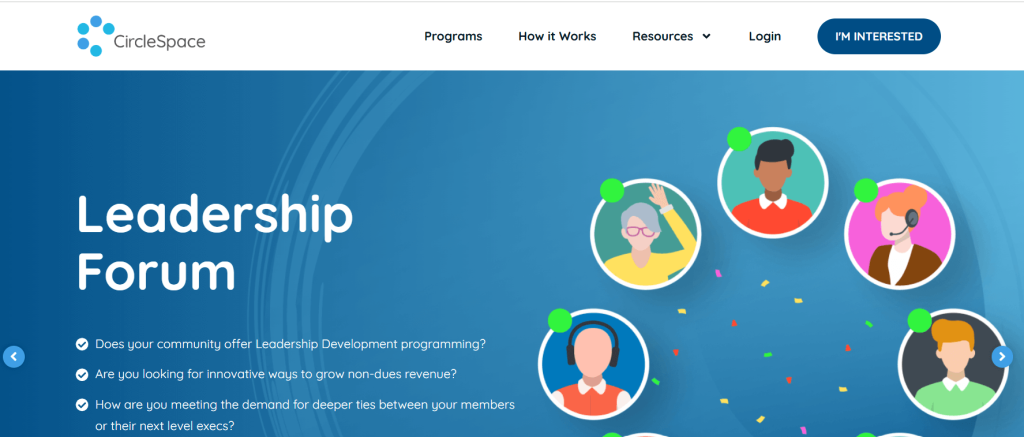
CircleSpace is a next-generation hybrid community and learning platform built around “interactive spaces.” Each space combines video, chat, collaborative docs, and whiteboards in a single, persistent environment, making it ideal for remote workshops, masterminds, and cohort-based learning.
Assets/Features
- Persistent interactive rooms with integrated video, chat, and shared docs.
- Collaborative whiteboards for brainstorming and visual planning.
- Cohort-based learning tools with progress tracking.
- Custom branding is a feature that the comprehensive platform offers to enhance the user experience. And domain support.
- Built-in monetization is a feature that many top Skool alternatives provide to help creators earn revenue via subscriptions, one-time events, or bundles.
- Automated replays & transcripts for recorded sessions.
- Integrations with Notion, Miro, and Google Workspace.
Liabilities
- Requires stable, high-speed internet for optimal experience.
- Newer platform, smaller existing user community.
- Fewer third-party automations compared to mature tools like Kajabi.
Compared to Skool
CircleSpace excels at live, interactive, and collaborative learning environments where real-time creativity is the goal. Skool is stronger for evergreen communities with gamification and structured content libraries.
9. Uscreen
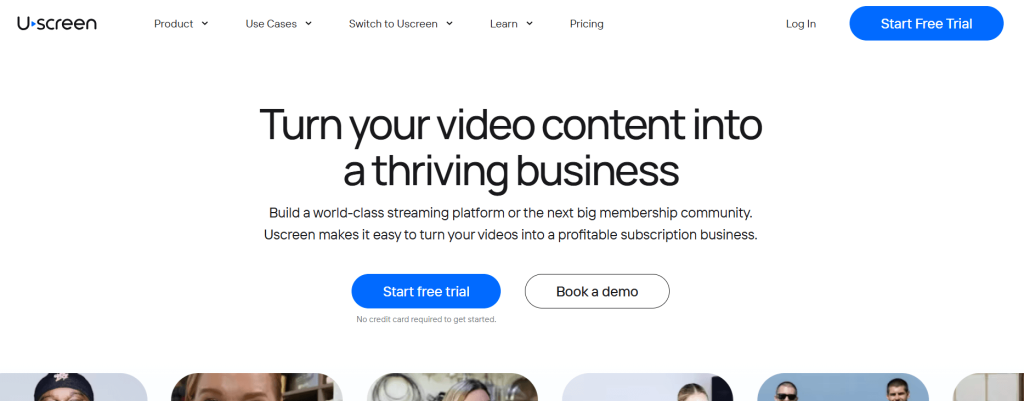
Uscreen is a video-first platform tailored for creators and brands that want to run their own subscription streaming service. It’s like having your own Netflix for your niche, with built-in community chat and monetization.
Assets/Features
- Branded OTT apps for TV platforms (Apple TV, Roku, Android TV) and mobile devices.
- Flexible monetization including subscriptions, pay-per-view, rentals, and purchases.
- Integrated live streaming with ticket sales and replay monetization.
- In-video chat for community interaction during streams.
- Advanced viewer analytics to track engagement and retention.
- Customizable storefront, a feature that sets it apart from the best alternative to Skool. To showcase your video catalog.
- Global content delivery network (CDN) for smooth streaming worldwide, ensuring a superior experience compared to Skool.
Liabilities
- Weak in text-based community tools, most engagement happens around video, while the Heights platform offers better text-based options.
- Technical setup and video production requirements are higher.
- It can be expensive depending on storage and streaming volume.
Compared to Skool
Uscreen dominates in video delivery and monetization, making it perfect for content-heavy brands. Skool offers a more balanced mix of text, video, and structured learning in a single community hub.
10. Podia
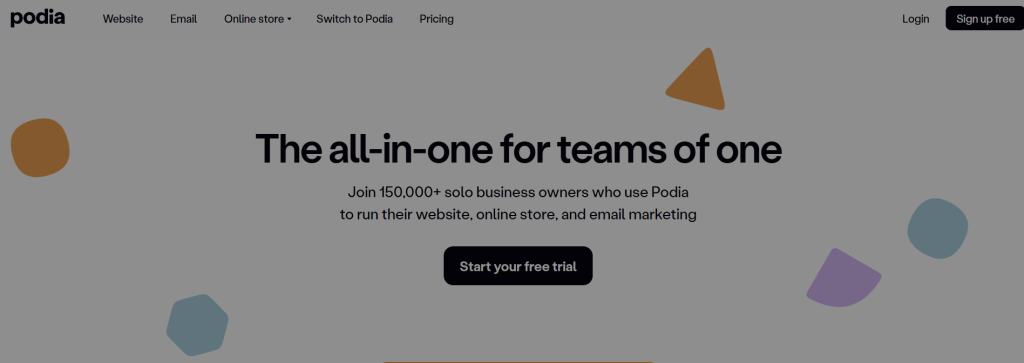
Podia is an affordable all-in-one platform for creators selling courses, digital downloads, memberships, and coaching services. It focuses on ease of use and zero transaction fees, making it an attractive option for users looking for a free trial.
Assets/Features
- No transaction fees on product sales.
- Built-in email marketing to stay connected with your audience.
- Membership and bundle support to package products creatively.
- Live chat widget for real-time member support or sales questions.
- Multi-product storefront for courses, downloads, webinars, and coaching.
- Drip content scheduling for gradual release of lessons or resources.
- Simple site builder to create your storefront without coding.
Liabilities
- Limited automation compared to higher-end platforms like Kajabi.
- Basic community functionality that’s not designed for deep engagement.
- No advanced gamification or learning management features.
Compared to Skool
Podia is great for selling a variety of digital products without worrying about platform fees. Skool is better if your priority is creating an interactive, member-driven learning environment.
11. BetterMode
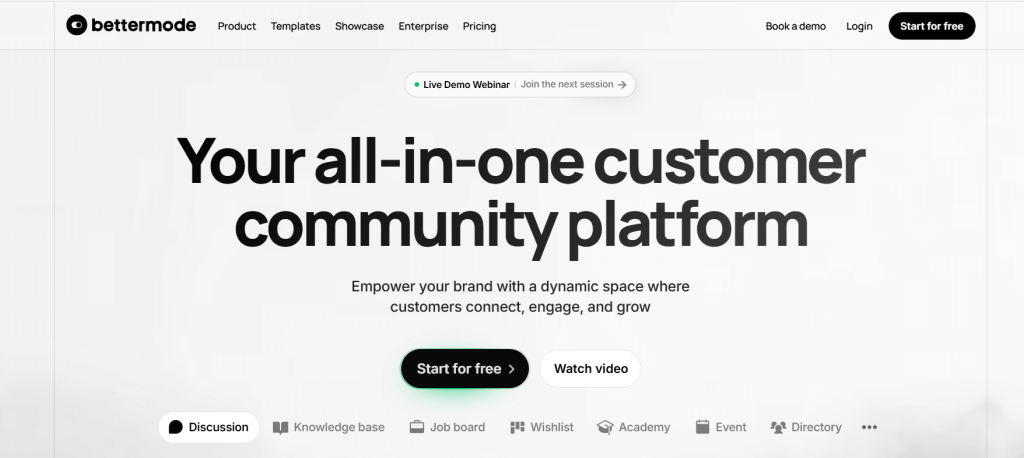
Bettermode (formerly known as Tribe) is a powerful, enterprise-ready community platform used by SaaS companies, brands, and educators. It’s highly customizable and designed to integrate seamlessly into your business ecosystem.
Assets/Features
- Single Sign-On (SSO) and enterprise compliance features for security.
- An app store with extensions to expand functionality.
- White-label customization with custom CSS for full brand alignment.
- Advanced moderation workflows for large communities and mighty networks offer robust features that cater to diverse user needs.
- Rich analytics dashboard to measure engagement and content performance.
- Content organization with spaces, categories, and tagging.
- Multi-language support for global audiences.
Liabilities
- Steeper learning curve to configure and maintain.
- Higher cost compared to simpler community platforms.
- Overkill for small creators who don’t need enterprise-level features.
Compared to Skool
Bettermode excels in complex, enterprise-level communities with strict branding and security needs. Skool is simpler, faster to deploy, and focused on creating a lively, gamified member experience.
12. Discourse
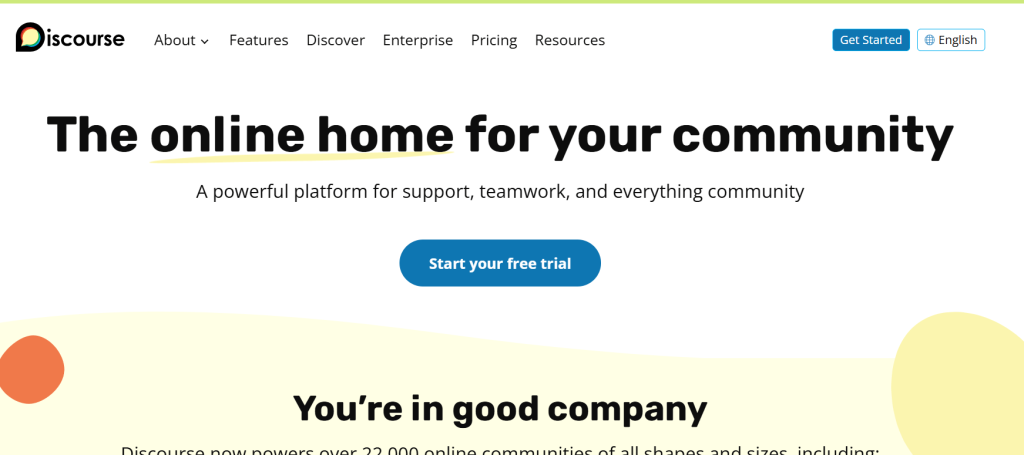
Discourse is a robust, open-source forum platform designed for modern online communities. It’s widely used by tech companies, developer groups, and knowledge-sharing hubs that want full control over their data and customizability.
Assets/Features
- 100% data ownership, host it yourself, or choose managed cloud hosting.
- Extensive plugin ecosystem for polls, badges, events, and more.
- Theme and CSS customization for brand-aligned design.
- Single Sign-On (SSO) and API integration.
- Powerful moderation tools include spam filters, trust levels, and flagging.
- Scales to millions of posts without performance loss.
- Free self-hosting option for complete budget control.
Liabilities
- Requires technical skills if self-hosting.
- Forum-style UX may feel less engaging for casual social communities.
- Lacks built-in live streaming or real-time video.
Compared to Skool
Discourse offers unmatched customization and control, making it ideal for serious, long-term knowledge bases. Skool is faster to launch and better suited for creators wanting gamified, daily engagement without the technical overhead.
13. Facebook Groups
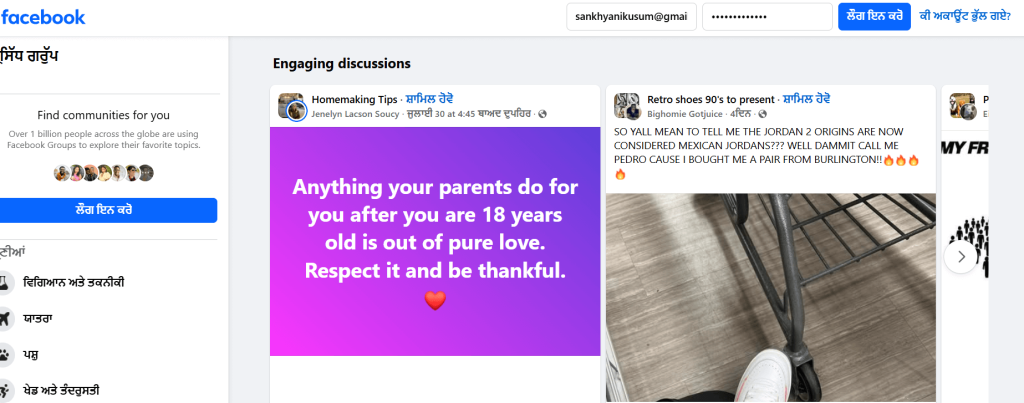
Facebook Groups remain one of the largest free community tools available, offering instant discoverability via Facebook’s social graph. They’re great for quickly building large, open, or semi-private groups without upfront costs.
Assets/Features
- Massive organic reach through Facebook’s existing user base.
- Built-in group discovery for attracting new members.
- Native live video streaming inside groups.
- Group analytics & insights for understanding engagement.
- Event creation tools for meetups, webinars, or launches.
- Polls, file sharing, and post scheduling are built in.
- Free to use.
Liabilities
- No branding control, all groups look like Facebook’s default layout.
- Algorithm changes can reduce post visibility.
- Limited monetization options without directing members off-platform.
Compared to Skool
Facebook Groups win for quick audience growth and discoverability. Skool is better for private, branded communities with a more distraction-free learning environment.
14. Slack
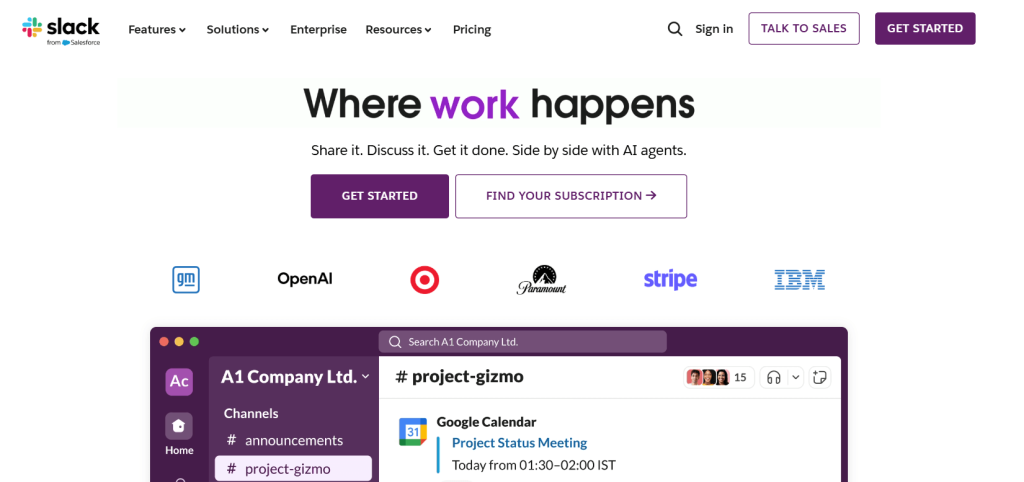
Originally designed as a workplace communication tool, Slack has evolved into a versatile platform for private communities, masterminds, and niche groups. It’s real-time and chat-centric, making it perfect for fast-moving discussions.
Assets/Features
- Organized channels & threads for topic-based conversation, the Heights platform offers structured discussions that can enhance engagement.
- App integrations with tools like Zapier, Google Drive, Notion, and Trello.
- Advanced search for finding past discussions and files.
- Audio huddles and video calls for quick meetings.
- File sharing and storage are built in.
- Custom bots & workflows to automate tasks.
Liabilities
- No built-in monetization features.
- It can get noisy with high message volume.
- Paid plans are required for large groups or access to full message history.
Compared to Skool
Slack is ideal for fast, chat-based collaboration with productivity integrations. Skool is better for structured content delivery, gamification, and long-form learning discussions.
15. Swarm
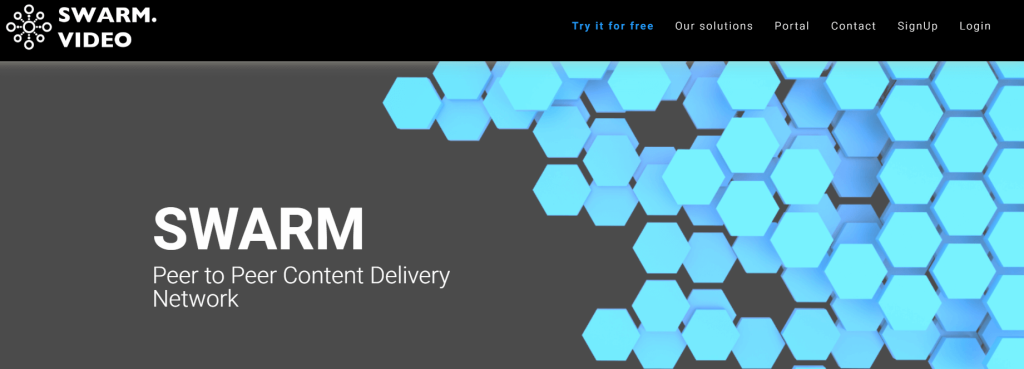
Swarm is a live video-first community platform built for hosting interactive events, workshops, and virtual gatherings. It’s designed for creators who thrive on high-engagement, real-time interactions, similar to what Kajabi provides.
Assets/Features
- Multi-host live events with audience participation.
- Replay monetization is a feature that the platform provides to maximize content value for post-event sales.
- Interactive tools like polls, Q&A, and chat overlays.
- Ticketing integrations allow you to create seamless experiences for event management. For paid events.
- HD streaming experience compared to school. With low-latency performance.
- Custom branding on event pages.
Liabilities
- Less suited for text-heavy or long-term community discussions.
- Smaller user base compared to mainstream platforms.
- Limited built-in course hosting features.
Compared to Skool
Swarm is perfect for event-driven communities where live interaction is the main draw. Skool is better for ongoing, persistent communities where members stay engaged between events.
16. PeerBoard
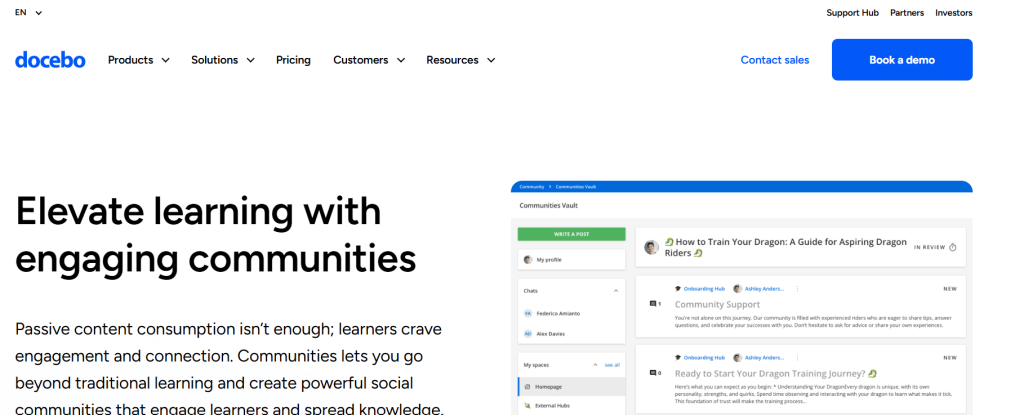
PeerBoard is an embeddable community platform designed to seamlessly integrate with your existing website, online course, or SaaS product. It’s lightweight, SEO-friendly, and ideal for brands that want their community to feel native to their site.
Assets/Features
- SEO-friendly public posts are essential for finding the best platform to increase visibility. To help community discussions rank in Google.
- Easy embedding into WordPress, Teachable, Thinkific, and custom sites.
- Custom member profiles and private messaging.
- Moderation tools for managing spam, posts, and member behavior.
- Content categorization with tags and sections.
- A notifications system to keep members engaged.
- Custom branding to match your site’s look and feel, as Mighty Networks offers customizable options.
Liabilities
- No built-in video hosting or live streaming.
- Mobile experience is functional but less polished than app-first platforms.
- Limited gamification options.
Compared to Skool
PeerBoard is ideal if you want to integrate community features directly into your existing website without moving members to a new platform. Skool, on the other hand, is a standalone, all-in-one community + course hub with stronger engagement mechanics.
17. Vanilla Forums (Higher Logic)
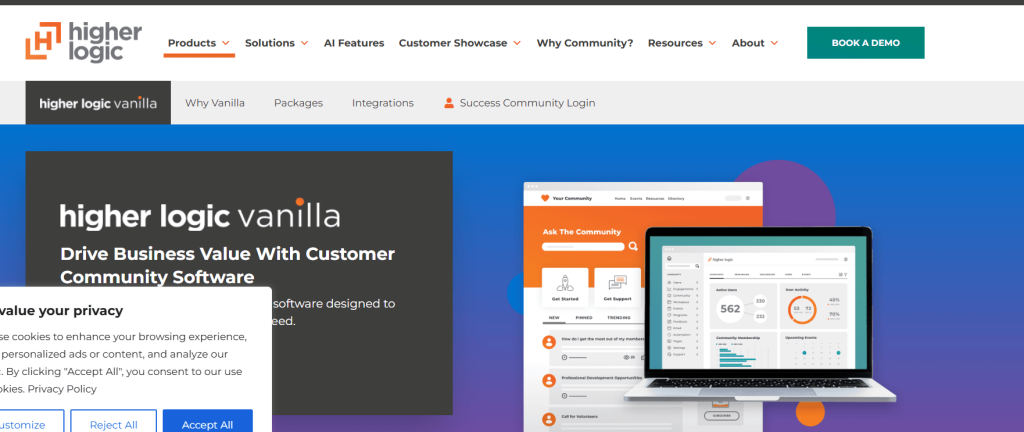
Vanilla Forums, now under Higher Logic, is an enterprise-grade discussion forum and community solution used by large organizations, software companies, and membership associations. It focuses on structured discussions, knowledge bases, and support communities.
Assets/Features
- White-label branding with custom theming.
- Integrated knowledge base for searchable help content, which enhances user experience, unlike Skool.
- Gamification features include badges, points, and leaderboards.
- Advanced moderation with AI-assisted tools.
- Comprehensive analytics to track engagement and ROI.
- SSO and enterprise security compliance.
- Multi-language support for global organizations.
Liabilities
- Pricing is geared toward enterprise budgets.
- Forum format feels more formal, less social-media-like.
- Overkill for small or casual communities.
Compared to Skool
Vanilla is excellent for structured, large-scale support and discussion forums with enterprise compliance needs. Skool is better for smaller, high-energy creator or coaching communities that thrive on casual engagement.
18. Elgg
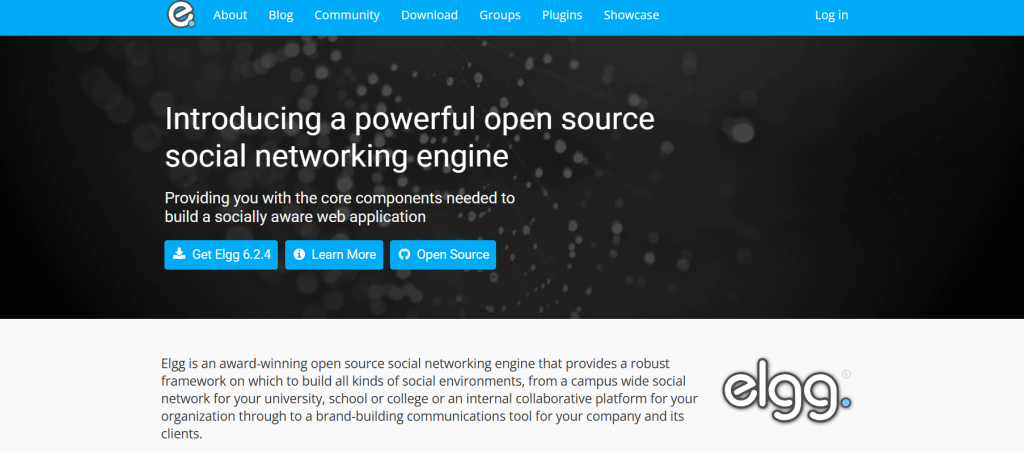
Elgg is a powerful, open-source social networking engine that lets developers build completely custom online communities. It’s flexible enough for anything from niche networks to enterprise intranets, provided you have the technical skills.
Assets/Features
- Full plugin architecture for adding custom features.
- Custom themes allow you to create a unique brand identity, as Skool makes it easy to customize for complete brand control.
- Multi-user blogs, file sharing, and activity streams.
- Self-hosted for full data ownership and privacy.
- User groups for segmenting communities.
- Rich developer documentation. The platform allows for an active, open-source community to thrive and innovate together.
Liabilities
- Requires developer skills to set up, customize, and maintain.
- Out-of-the-box design is basic compared to modern SaaS tools, especially when you consider the heights the platform offers in terms of aesthetics.
- No native mobile apps without custom development, which is a limitation when compared to platforms like Skool.
Compared to Skool
Elgg gives you full freedom to create exactly what you want if you have technical resources. Skool offers a ready-made, polished platform that you can launch in hours without coding.
19. eFront
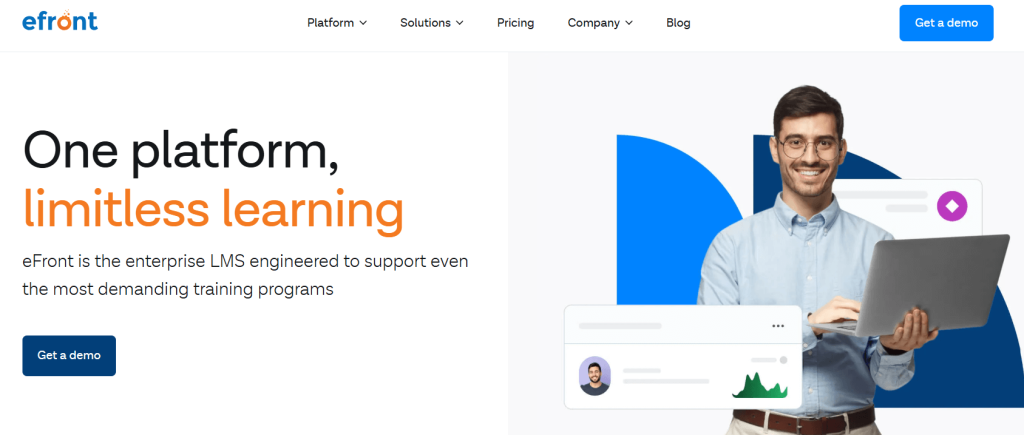
eFront is a corporate learning management system (LMS) designed for compliance-driven training environments. It’s heavily used by enterprises, governments, and large organizations needing strict control over learning content and user permissions.
Assets/Features
- SCORM & xAPI (Tin Can) compliance for standardized e-learning.
- White-label portals for different departments or clients, making it the best alternative to Skool.
- Advanced reporting and analytics for compliance tracking.
- Multi-tenant architecture for managing separate audiences.
- Custom roles and permissions to fit organizational structures.
- Offline learning mode for regions with limited internet.
- Integrations with HR and ERP systems.
Liabilities
- Designed for formal training, not casual community engagement.
- Expensive compared to creator-focused platforms.
- Steeper learning curve for admins.
Compared to Skool
eFront is the go-to choice for corporate training programs that require compliance and audit-ready reporting. Skool is better for flexible, creator-driven communities without heavy regulatory demands, but there are seven alternatives worth considering.
20. Heights Platform
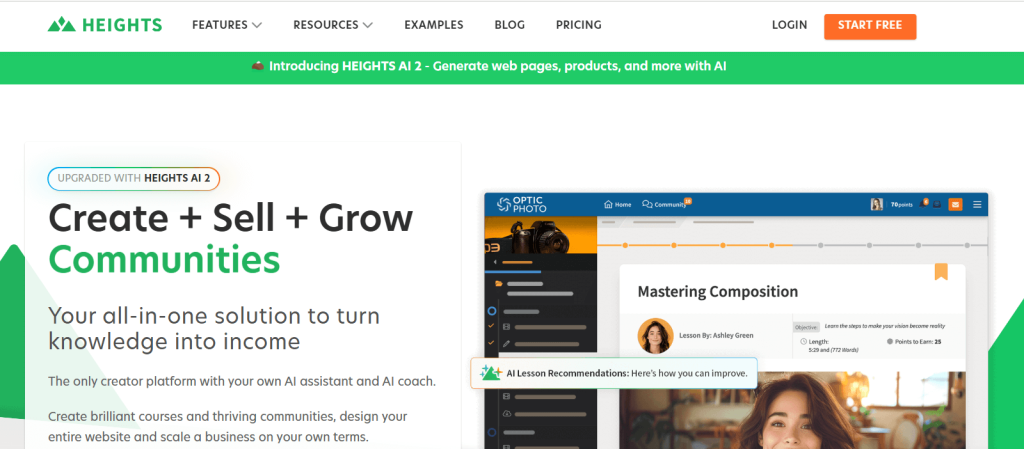
Heights Platform is a course creation and learning community tool that emphasizes gamified, project-based learning. It’s designed for creators who want students to actively build and apply knowledge, not just watch videos.
Assets/Features
- Gamification with points, badges, and milestones.
- Project-based learning involves students submitting and showcasing work.
- White-label courses with full brand control.
- Lifetime access options to learning materials.
- Built-in email marketing for student communication.
- Drip scheduling for content release.
- Payment flexibility with one-time, subscription, or installment plans.
Liabilities
- Community features take a back seat to course delivery.
- Limited third-party integrations compared to Kajabi or Thinkific.
- Smaller ecosystem of plugins and extensions.
Compared to Skool
Heights is perfect for creators who want to gamify and structure the learning journey. Skool is better if your focus is on fostering an active, social community alongside structured learning.
Common mistakes people make
- Chasing shiny features nobody uses
- Choosing a platform that’s too complex for your budget
- Forgetting long-term export or portability
- Ignoring mobile experience or app UX
- Skipping compliance or team access mapping
Conclusion – Choosing the Right Skool Alternative for 2025
The truth is, there’s no one-size-fits-all community platform. Your ideal Skool alternative depends entirely on what you’re building, how you want to engage members, and the business model behind it.
If you’re a creator focused on monetization and customization, platforms like Whop, Kajabi, and Mighty Networks give you the tools to sell, scale, and brand your community on your own terms.
If you’re education-first, Teachable, Thinkific, Heights Platform, and eFront bring robust course delivery, perfect for structured learning or compliance-driven training.
For live, collaborative, and high-engagement communities, Circle, Discord, CircleSpace, and Swarm keep members interacting in real time, while Bettermode, Vanilla Forums, and PeerBoard shine when you need structured discussions, moderation, and integrations.
